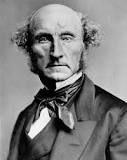Liberty Matters
Comment on Responses
 First and foremost, I want to express my gratitude for all three of the sensitive and erudite responses to my essay that have been posted here. All raise questions for further discussion that I will attempt to summarise briefly, hoping that this post will encourage more interesting thoughts.
First and foremost, I want to express my gratitude for all three of the sensitive and erudite responses to my essay that have been posted here. All raise questions for further discussion that I will attempt to summarise briefly, hoping that this post will encourage more interesting thoughts.Georgios Varouxakis is right to point out that my discussion of Mill's interest in Turgot's life needs to be balanced by an understanding of his involvement with Plutarch's Lives. I would be particularly interested in exploring whether Plutarch's habit of pairing a famous with a more obscure life was important to Mill? It seems to me that in the two examples Georgios touches on in his response – General Lafayette and Armand Carrel – there is scope for exploring this question. Mill did not, of course, pair these lives. But it is interesting that he has space for both in his firmament of lives that might serve as inspiration to others seeking to shape their own characters.
Jeremy Jennings draws attention to this crucial component of Mill's philosophy and biographical understanding: the individual's power to shape her or his own life and to escape the "manufacturing" or controlling influences of circumstance. I agree with Jeremy's correction to my essay: Mill was never entirely set free from his upbringing, and his ongoing struggles to escape led to "the drama and the pain in the life-writing that is Mill's Autobiography." But my own view is that this was not a failure on Mill's part, any more than his "exaggerated praise" of Harriet Taylor was an objective mistake. When it comes to the content of a relationship between lovers, who are outsiders to judge what counts as exaggeration or truth? No doubt Mill had friends and admirers who thought his feelings for Taylor, and his account of her role in his life, exaggerated. But the question we must ask is: Were they, or are we, really in a better position to decide this question than he was?
This brings me to David Conway's excellent response. I do not, as he suggests, think the Edinburgh Review remiss for reporting Bentham's defamatory statements about Mill's father. Not at all. What I wanted to do was to draw attention to Mill's fierce defence of his father, which reminds me of a common biographical reflex: whilst it seems perfectly acceptable (indeed necessary) for me to criticise my parents to myself and to others, I am immediately moved to defend them if someone else criticises them. I think Mill felt similarly.
I want to end by saying how much I have enjoyed these exchanges. In this time of isolation, when conferences seem a distant dream, it is a great comfort to be able to replicate a Liberty Fund event online. My thanks to all who have made this possible.
Copyright and Fair Use Statement
“Liberty Matters” is the copyright of Liberty Fund, Inc. This material is put on line to further the educational goals of Liberty Fund, Inc. These essays and responses may be quoted and otherwise used under “fair use” provisions for educational and academic purposes. To reprint these essays in course booklets requires the prior permission of Liberty Fund, Inc. Please contact oll@libertyfund.org if you have any questions.